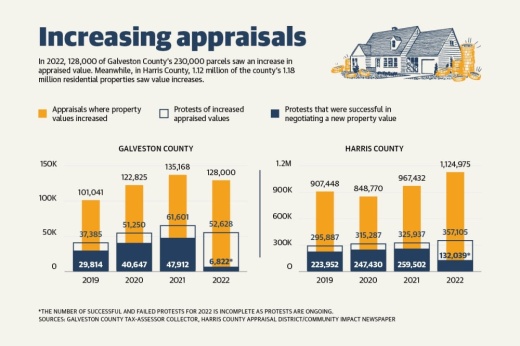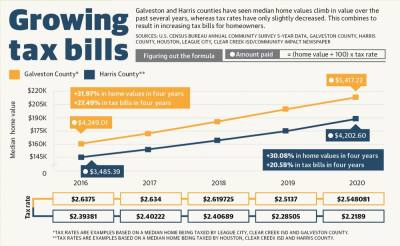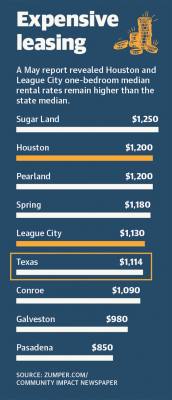Cheryl Johnson, the elected tax-assessor collector for Galveston County, said she is working alongside Galveston County Judge Mark Henry and state Rep. Greg Bonnen, R-Friendswood, among others, to convince lawmakers to provide property tax relief to Texans in the upcoming legislative session, which will begin in January. As tax-assessor collector, Johnson helps determine and collect taxes.
“People are getting taxed out of their homes,” she said.
In addition, the rise in overall property values across the Greater Houston area has caused some prospective homeowners to be priced out of the housing market all together, ApartmentData.com CEO Bruce McClenny said. This results in those people entering the renting market to seek apartments and other types of rental housing, which has also caused an explosion in rent rates.
Appraisal concerns
Every year in each county, appraisers value homes and other properties at their market value as of Jan. 1 of that year. They determine this amount based on various factors, including what homes of similar sizes and location are selling for, said Jack Barnett, chief communications officer for the Harris County Appraisal District.
Homeowners are then mailed their appraisal, which shows what their home was appraised for and the value they will be taxed for. Many residences across the Greater Houston area are seeing appraisal increases, officials said.
Of Harris County’s 1.8 million parcels, more than 97% of residential properties and more than 95% of commercial properties saw increases year over year in 2022, according to HCAD data. This is the highest percentage of increasing property values since at least 2011 with 2021 being the next closest with 86% of residential and 87% of commercial properties seeing year-over-year increases.
“This year there was just a lot going on in the economy, and values kept increasing,” Barnett said. “It was a very unusual year for values going up.”
According to Galveston County tax-assessor collector data, 128,000 of the county’s 230,000 parcels—or about 55%—saw appraisal increases in 2022. This is the highest amount since at least 2015, excluding 2021, which had more than 135,000 increases.
“They are really bad,” Henry said of increasing appraisals, noting he owns a property that increased from $100,000 to $400,000 in a single year.
In addition to the high number of increases this year, the increases themselves are large, Johnson said.
“We’re seeing huge value increases,” she said. “People are flooding the state, buying property. ... That’s creating a very hot market.”
Additionally, there is a shortage of inventory, making the market even hotter. Homes in Friendswood, where Johnson lives, can sell for $100,000 to $200,000 above the asking price to highly motivated buyers, she said.
Homeowners have the opportunity to protest the value of their home if they believe it was appraised higher than it is worth—something Johnson encourages every homeowner to do. Through the protest process, residents can show evidence their appraisal should be lower, and if successful, they end up paying less in property taxes.
Galveston County data shows in 2022, about 52,600 property owners, or 41% of those who saw increases, protested their appraisals. The percentage of those who were successful is pending until all protests are concluded later this year. In 2021, 46% protested, and over 77% were successful.
Similarly, 357,000 of the 1.12 million Harris County properties that saw appraisal increases in 2022 were protested. That means 32% of those who saw increases protested versus the 34%—80% of which were successful—in 2021.
Johnson speculated many homeowners who saw increases in 2021 during COVID-19 had the time and motivation to protest, which may have diminished this year.
“People are weary. I think that’s why fewer people are [protesting],” she said. “Most are too frustrated to do it, quite frankly, and it’s a shame.”
Reform efforts
In addition to protesting appraisals, homestead exemptions are another way homeowners can reduce their tax bills. These exemptions remove a portion of a home’s value from being taxed, and they cap how much a home’s taxable value can increase year over year to 10%.
However, in Johnson’s and Henry’s opinion, protests and homestead exemptions are not enough.
Galveston County is one taxing entity among many that tries to lower its tax rate every year to make up for growing property values. Since 2010, the county has decreased its tax rate 33% to $0.41494 per $100 valuation, according to county records.
Harris County has been decreasing its tax rate since at least 2018. As of 2021, the county’s tax rate was nearly 10% lower than it was in 2017.But even as the rates drop, property values increase faster, often leading to bigger tax bills for homeowners year over year, Johnson said.
“It’s a bad system, and it’s one that needs to be fixed,” Henry said.
Johnson, Henry, Bonnen and others are therefore working on solutions.
One idea is for the state to switch to a price-paid system. Under this system, a property’s appraised value would be locked to the amount at the date of purchase. It would remain there unless the house underwent major renovations or it was sold, in which case a new value would be appraised and locked in, Johnson said.
Homeowners are partly responsible for economic development, which occurs in growing areas, and homeowners want their communities to be attractive, all of which results in increasing home values, Johnson said. A price-paid system reduces the number of residents who help make areas successful from being taxed out of their homes and allows homebuyers to know upfront what their taxes will be and what is affordable, she said.
Another idea is to lower the statewide homestead exemption appraisal cap from 10% to a maximum of 5% and to appraise homes every other year rather than annually. Additionally, the change would apply to all homeowners, not just those with exemptions.
Johnson said she believes appraisal reform has a good chance of passing in the upcoming state legislative session.
Several Galveston County chambers of commerce in April signed a letter asking the Texas House Ways and Means Committee to address appraisal reform, saying “swelling property appraisals are ... siphoning off the hard-earned profits of everyday Texans.” Galveston County Commissioners Court on April 18 passed a resolution supporting the state capping appraisal increases at 3.5% annually.Politicians who want to stay in office must respond with reform, Johnson added.
“People get tired of hearing the same old promises and no action,” she said. “They can’t do this anymore. They’ve reached critical mass.”
Rent increases
The rise in property values is affecting homeowners when it comes to taxpaying time as well as those seeking to rent out apartments.
According to a May 31 report by Zumper, a site where users can find rentable housing, rents for apartments have increased across the Greater Houston area.League City and Houston have seen median one-bedroom rents rise by 22.8% and 15.4% in the last year, respectively—the second and third highest among eight Houston-area cities, including Pearland and Sugar Land. For median two-bedroom rents, the increases are 14.8% and 20.9% year over year for League City and Houston, respectively.
Additionally, League City’s median one-bedroom rent is $1,130, and Houston’s is $1,200, second only to Sugar Land’s at $1,250. The state median is $1,114.“The demand drives it all just like demand drives every other thing we are hearing about,” McClenny said. “I think we’re getting more demand because of the single-family stream. When you’re priced out and give up trying to buy, renting is your only other option.”
Shawn Arrajj & Andy Yanez contributed to this report.








